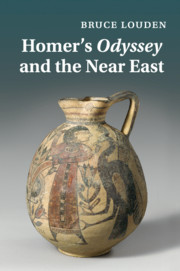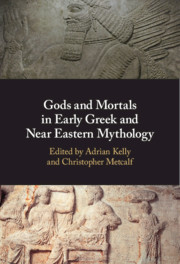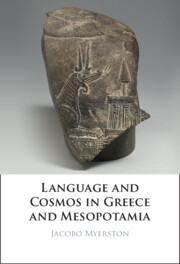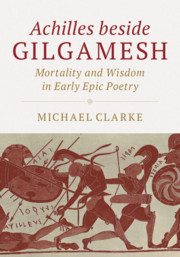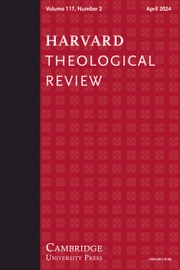Homer's Odyssey and the Near East
- Author: Bruce Louden, University of Texas, El Paso
- Date Published: January 2019
- availability: Available
- format: Paperback
- isbn: 9781108730136
Paperback
Other available formats:
Hardback, eBook
Looking for an inspection copy?
This title is not currently available on inspection
-
The Odyssey's larger plot is composed of a number of distinct genres of myth, all of which are extant in various Near Eastern cultures (Mesopotamian, West Semitic, and Egyptian). Unexpectedly, the Near Eastern culture with which the Odyssey has the most parallels is the Old Testament. Consideration of how much of the Odyssey focuses on non-heroic episodes - hosts receiving guests, a king disguised as a beggar, recognition scenes between long-separated family members - reaffirms the Odyssey's parallels with the Bible. In particular the book argues that the Odyssey is in a dialogic relationship with Genesis, which features the same three types of myth that comprise the majority of the Odyssey: theoxeny, romance (Joseph in Egypt), and Argonautic myth (Jacob winning Rachel from Laban). The Odyssey also offers intriguing parallels to the Book of Jonah, and Odysseus' treatment by the suitors offers close parallels to the Gospels' depiction of Christ in Jerusalem.
Read more- Provides close analysis of the Odyssey's use of distinct types of myths
- Discusses unexpected parallels shared by the Odyssey with Gilgamesh and the Bible
- Corrects mistaken interpretations of many biblical episodes, especially Genesis 19
Reviews & endorsements
'The study of the densely woven fabric that holds together Aegean and Near Eastern cultures since the Bronze Age continues to fascinate researchers and readers. This book is a welcome addition to recent studies, which are advancing this field by moving past the rather impressionistic and cataloguing approach that prevailed in previous decades … Louden's nuanced and not unidirectional line of comparative work opens up new perspectives for Hellenists, as well as biblical and Near Eastern scholars … it will be a useful reference for future research.' Carolina López-Ruiz, Classical World
See more reviews'This is a rewarding book. L[oudon] is a literary critic blessed with analytical insight … His studies have ranged widely, without superficiality; and his capacity for illuminating comparisons manifests itself throughout.' G. L. Huxley, Hermathena
'… this study will be welcomed by all who have an interest in the interaction of Greek and Near Eastern poetry, myth, and culture generally.' Annette Teffeteller, Journal of the American Oriental Society
Customer reviews
Not yet reviewed
Be the first to review
Review was not posted due to profanity
×Product details
- Date Published: January 2019
- format: Paperback
- isbn: 9781108730136
- length: 364 pages
- dimensions: 229 x 151 x 20 mm
- weight: 0.532kg
- availability: Available
Table of Contents
Introduction
1. Divine councils and apocalyptic myth
2. Theoxeny: Odyssey 1, 3, 13–22, and Genesis 18–19
3. Romance: the Odyssey and the myth of Joseph (Genesis 37, 39–47)
4. Helen and Rahab (Joshua 2), Menelaus and Jacob (Genesis 32:22–32)
5. Ogygia and creation myth, Kalypso and Ishtar
6. Argonautic myth: Odysseus and Nausikaa/Circe, Jason and Medea, Jacob and Rachel (Odyssey 6–8, 10–12, 13.1–187, Genesis 28–33)
7. Odysseus and Jonah: sea-monsters and the fantastic voyage
8. The combat myth: Polyphemos and Humbaba
9. Catabasis, consultation, and the vision: Odyssey 11, 1 Samuel 28, Gilgamesh 12, Aeneid 6, and the Book of Revelation
10. Odyssey 12 and Exodus 32: Odysseus and Moses, the people defy their leader and rebel against God
11. The suitors and the depiction of impious men in wisdom literature
12. Odysseus and Jesus: the King returns, unrecognized and abused in his own Kingdom
13. Contained apocalypse: Odyssey 12, 13, 22 and 24, Exodus 32 (and Genesis 18–19)
Conclusion.
Sorry, this resource is locked
Please register or sign in to request access. If you are having problems accessing these resources please email [email protected]
Register Sign in» Proceed
You are now leaving the Cambridge University Press website. Your eBook purchase and download will be completed by our partner www.ebooks.com. Please see the permission section of the www.ebooks.com catalogue page for details of the print & copy limits on our eBooks.
Continue ×Are you sure you want to delete your account?
This cannot be undone.
Thank you for your feedback which will help us improve our service.
If you requested a response, we will make sure to get back to you shortly.
×
